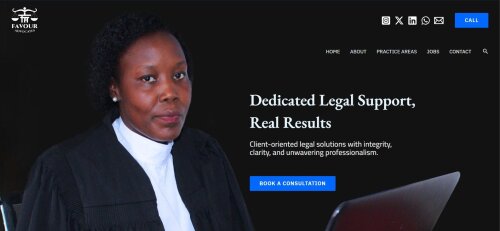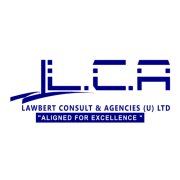Best Probate Lawyers in Uganda
Share your needs with us, get contacted by law firms.
Free. Takes 2 min.
Or refine your search by selecting a city:
List of the best lawyers in Uganda
About Probate Law in Uganda
Probate in Uganda involves a legal process that takes place after someone dies to ensure that their estate is distributed according to their will, or according to the law if no will exists. The central aim is to validate the deceased person's will (if available), settle any debts, and then distribute the remaining estate to the rightful heirs. Uganda follows the Succession Act, which outlines the rules and procedures for granting probate and administering estates.
Why You May Need a Lawyer
Engaging a lawyer for probate matters in Uganda can be beneficial for various reasons:
- Complexity of Laws: The probate process can be complicated, involving various legal terms and procedures that might be difficult for someone without a legal background to understand.
- Disputed Wills: If the validity of a will is contested, legal expertise is essential to navigate disputes and reach a settlement.
- Estate Taxation: Lawyers can provide guidance on tax implications regarding the transfer of assets in the estate.
- Asset Distribution: Legal help ensures that the distribution of the estate is conducted fairly and according to the law.
- Estate with Debts: If the deceased had outstanding debts, a lawyer can help in the settlement of these obligations before distribution.
Local Laws Overview
Key aspects of local laws related to probate in Uganda include:
- The Succession Act: This law governs matters of testate (with a will) and intestate (without a will) succession.
- Probate Registry: Probates and letters of administration must be obtained from a probate registry in Uganda.
- Eligibility: Executors are appointed as per the will; if no will is present, an administrator is appointed under the law.
- Timeframe: Probate should ideally be applied for within six months of the testator's death; delays can attract complications.
- Heirs and Beneficiaries: The law outlines clear guidelines on inheritance rights for spouses, children, and other relatives.
Frequently Asked Questions
What is probate?
Probate is the legal process of authenticating a deceased person’s will, assessing their assets, paying outstanding debts, and distributing the remaining estate to beneficiaries.
Do all estates go through probate in Uganda?
Not all assets are subject to probate. Some jointly-owned assets and accounts with designated beneficiaries can pass directly without going through the probate process.
How long does the probate process take in Uganda?
The duration can vary based on the complexity of the estate and any disputes or claims that arise. It often takes several months; complex cases can take longer.
Can a will be contested?
Yes, wills can be contested, commonly on grounds of mental incapacity, undue influence, or fraud. Legal advice is often needed to resolve such disputes.
What happens if someone dies intestate (without a will)?
If a person dies intestate, their estate is distributed according to the statutory order of inheritance as provided under the Succession Act.
Who is responsible for executing a will?
The executor named in the will is responsible for executing it. If no executor is named, or if there’s no will, the court can appoint an administrator.
Can the executor of an estate be a beneficiary?
Yes, an executor can also be a beneficiary. It is common for trusted family members or friends to be named executors and beneficiaries.
What are letters of administration?
Letters of administration are documents issued by a probate registry granting authority to an administrator to manage and distribute the estate of someone who died without a will.
How are debts handled during probate?
Debts are prioritized and settled before any distribution to heirs. Executors or administrators are responsible for using estate assets to clear outstanding debts.
Can probate be avoided?
Certain steps like joint ownership or setting up trusts can help avoid probate for some assets, but complete avoidance is not guaranteed and often requires planning.
Additional Resources
For further assistance, the following resources may be helpful:
- Uganda Law Society: Offers a directory of licensed legal practitioners specializing in probate.
- Justice Centres Uganda: Provides free legal assistance and guidance.
- Probate Registries: Located within the High Court circuits across the country, offering assistance in obtaining probate or administration letters.
- Ministry of Justice and Constitutional Affairs: Oversees legal operations and can provide further guidance on probate regulations.
Next Steps
If you need legal assistance for probate in Uganda, consider the following steps:
- Consult with a lawyer experienced in probate to discuss your situation and understand your legal options.
- Gather all necessary documentation, including the deceased’s will, death certificate, and asset information.
- File a probate application with the relevant probate registry through your legal representative.
- Be prepared for potential disputes or claims, and ensure that these are resolved with professional guidance.
- Stay informed about the process and communicate actively with your legal adviser to ensure a smooth execution and distribution of the estate.
Lawzana helps you find the best lawyers and law firms in Uganda through a curated and pre-screened list of qualified legal professionals. Our platform offers rankings and detailed profiles of attorneys and law firms, allowing you to compare based on practice areas, including Probate, experience, and client feedback.
Each profile includes a description of the firm's areas of practice, client reviews, team members and partners, year of establishment, spoken languages, office locations, contact information, social media presence, and any published articles or resources. Most firms on our platform speak English and are experienced in both local and international legal matters.
Get a quote from top-rated law firms in Uganda — quickly, securely, and without unnecessary hassle.
Disclaimer:
The information provided on this page is for general informational purposes only and does not constitute legal advice. While we strive to ensure the accuracy and relevance of the content, legal information may change over time, and interpretations of the law can vary. You should always consult with a qualified legal professional for advice specific to your situation.
We disclaim all liability for actions taken or not taken based on the content of this page. If you believe any information is incorrect or outdated, please contact us, and we will review and update it where appropriate.
Browse probate law firms by city in Uganda
Refine your search by selecting a city.














